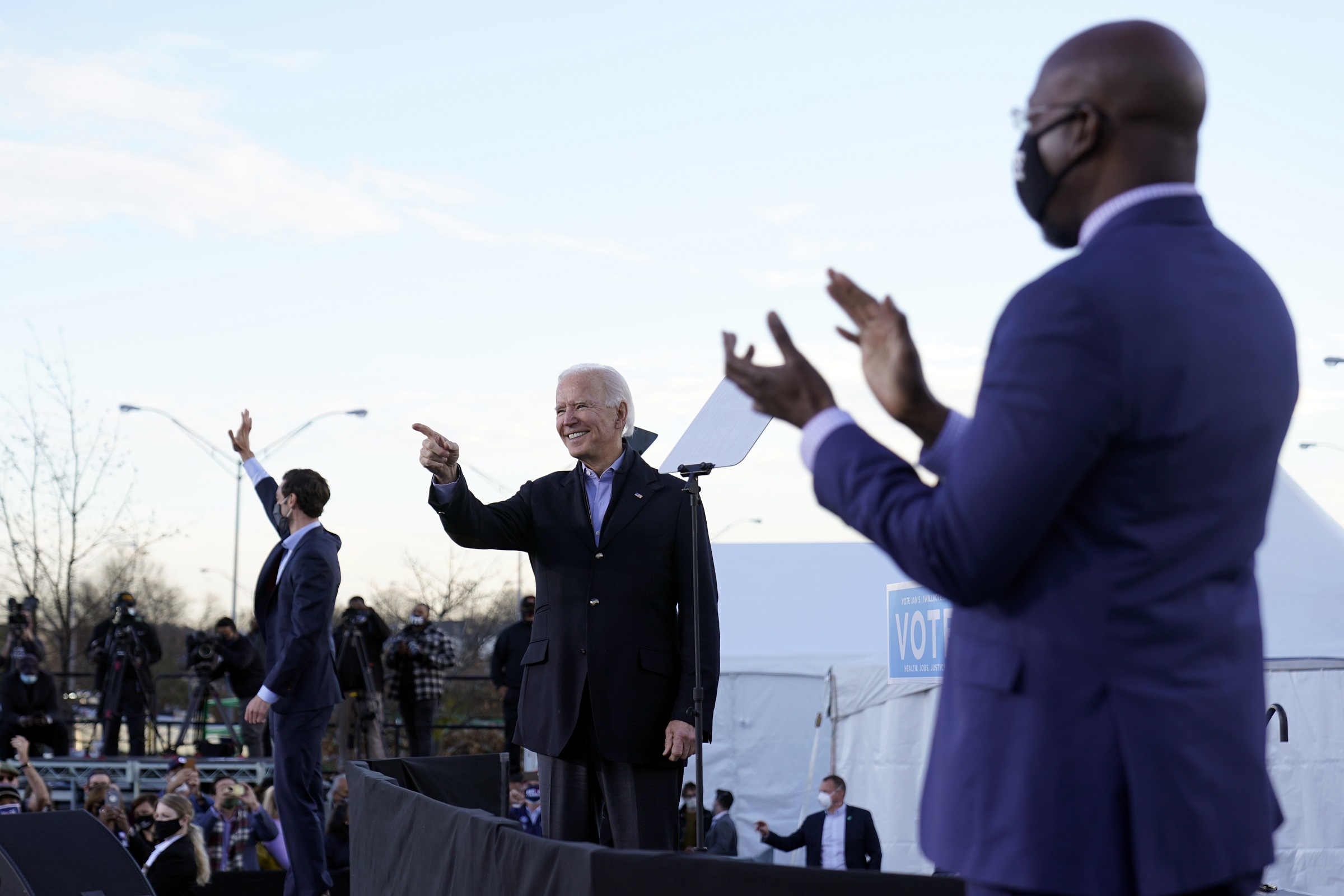The arrival of Senators-elect Raphael Warnock and Jon Ossoff will make it easier for the next president to get some things—but not everything—done.
The victories by Reverend Raphael Warnock and Jon Ossoff in Georgia’s Senate runoff races have transformed the political landscape—not only for Georgians, who have elected to trade in a pair of self-dealing plutocrats for two progressives with genuine and demonstrated commitments to public service, but for all Americans.
With their wins last week, control of the U.S. Senate shifts to Democrats, removing a sizable obstacle to the implementation of President-elect Joe Biden’s agenda as he enters the White House. Had either Warnock or Ossoff lost their races, Biden would have been the first incoming president in more than 30 years whose party didn’t control both chambers of Congress on Inauguration Day. In a political universe as polarized as our country’s is right now, that would have meant tremendous difficulty for Biden as he set about trying to make cabinet appointments, name judges to the federal bench, or push through legislation.
Doing these things just got a lot easier for Biden. But with the Senate evenly split between 50 Republicans and 50 Democrats, even with Vice President Kamala Harris on hand to break ties, the new administration will have to do a lot of political juggling and dealmaking in order to achieve many of its more ambitious goals.
Yes, Democrats will control the Senate calendar, determining which bills come up for a vote and when; and yes, they’ll also be able to pass a good deal of legislation via rules pertaining to budget reconciliation, which allow certain bills (spending and tax bills, most notably) to pass with a simple majority vote. Those aren’t small achievements. But that doesn’t constitute a rubber stamp for Biden. He and his fellow Democrats will need the support of at least 10 Republicans to pass any bills that don’t fall under reconciliation—which would be many of them.
On top of that, the Democratic caucus in the Senate is ideologically diverse, ranging from self-identified democratic socialists (such as Vermont’s Bernie Sanders) to relative conservatives (such as West Virginia’s Joe Manchin). The incoming Senate majority leader, New York’s Chuck Schumer, will have to make sure that all of the members of his own caucus are on the same page before turning his attention to the other side of the aisle for support.
Still, the shift in Senate power will give the important parts of Biden’s economic recovery plans—reducing carbon pollution, creating jobs, and protecting communities—a much stronger chance of being realized. Here are some aspects of his agenda that this shift could potentially affect:
- Continued coronavirus-related aid that places the needs of desperate people before the line items of corporate wish lists. Unemployment rates are rising again, and U.S. workers continue to suffer. While necessary, the latest $900 billion coronavirus relief package, passed in the final days of 2020, is woefully insufficient. The Biden administration will need to pair any future comprehensive, science-based strategies for battling the disease and distributing vaccines with a plan—or, quite possibly, plans—to provide more relief for the tens of millions who need it. Such an ambitious goal can’t be achieved by executive order; it will require good-faith cooperation between the White House and members of Congress who are willing to set aside their differences and work together.
- A $2 trillion climate and infrastructure plan that puts clean energy, resiliency, and environmental justice at its center. Biden has made it his mission to set the United States on the path to net-zero carbon emissions by the year 2050. Among other things, his plan aims to end carbon pollution in our energy sector within the next 15 years, maximize energy efficiency in millions of buildings and homes within four years, repair crumbling infrastructure, and invest more money in public transportation, creating millions of new jobs in the process. Significantly, his plan would also allocate 40 percent of the benefits conferred from climate spending to frontline communities and create an Environmental and Climate Justice Division within the Department of Justice, in acknowledgement of the disproportionate impacts that pollution and climate change have on low-income communities and communities of color.
- The return of responsible leadership at federal agencies. Donald Trump turned the agencies designed to protect public health and natural resources inside out by installing a string of individuals with close ties to the fossil fuel and chemical industries as their leaders. In contrast, Biden’s picks to head these agencies—Michael Regan at the U.S. Environmental Protection Agency, Deb Haaland at the U.S. Department of the Interior, and Brenda Mallory at the Council on Environmental Quality—will work as hard at fighting pollution and preserving our nation’s lands and waters as people like Scott Pruitt, Andrew Wheeler, Ryan Zinke, and David Bernhardt worked at accommodating corporate interests. With Democrats in charge of the calendar, and with a simple majority of Senate votes being all that’s required to approve cabinet-level appointments, the nominations should go through far more easily than if Mitch McConnell were in charge.
- Passage of legislation aimed at protecting the rights of voters, furthering democracy, and fostering environmental justice. Right now, there are dozens of bills that have passed the House of Representatives and are simply awaiting an up-or-down vote in the Senate—but they’ve all been either slow-walked or tabled indefinitely by current Senate Majority Leader Mitch McConnell. Among them are the John R. Lewis Voting Rights Act—named for the recently deceased civil rights leader—which would combat voter suppression and the For the People Act, which would address voting rights, campaign finance, and the inequities that result from gerrymandered districts. Other bills, such as the Environmental Justice for All Act, are currently awaiting a vote in the House, where they’re also likely to pass. Previously these bills—and others that are just as worthy and much-needed—didn’t stand a chance of passing in the Senate. Now, they at least have a shot.


